Publications Awards
Institute Awards
The William Gardner Award
Award criteria
Purpose: For the best paper published in the Proceedings of the NDT Annual Conference by a person in the early stages of their career (subject to a satisfactory oral presentation). The person concerned (or one of them, if there is more than one author who qualifies) must also present the paper in person at the conference and, at the discretion of the session chair, answer any questions from the audience.
Details of the award: A certificate and a cash sum of £300.
Eligibility: The author of the paper must either be a student or within the first five years of full-time employment. He/she need not be a member of the Institute. In the case of multiple authorship, the early career-stage criterion must be satisfied by the first or second named author. If other authors also satisfy the criterion, the cash award is shared between all those authors satisfying the criterion, with each receiving a certificate. The free membership for one year is for the presenting author only.
The proposal regarding the first or second named author aims to ensure that the person being presented with the award has made a substantial contribution to the paper. Otherwise, there is a risk that the award could go, for example, to a multi-author paper having just one early career-stage author who only played a minor role in the work being reported.
Frequency: Yearly, if a suitable candidate is deemed.
Nomination arrangements: The author of an abstract and full paper for the event can indicate they wish to be considered when submitting online.
Four members of the panel are to be appointed by the NDT Sub-Committee. Each judge will be invited to score the entries on a point scale of 0 to 3 and send the scores to Karen Cambridge, who will total the scores, and the entry receiving the most points will be declared the winner, subject to a satisfactory oral presentation.
Entries: Entries should be submitted by selecting the BPA option on Manuscript Central
Awarding arrangements: The award will be made mainly on the basis of the quality of the written paper, rather than on the quality of the oral presentation. This will allow the judging process to be completed before the conference. However, a check will be made to ensure that the quality of the oral presentation of the proposed winner is acceptable. Furthermore, candidates should demonstrate by the way they present the paper and answer any questions that they have made a substantial technical contribution to the paper.
Publicity: The award will be fully reported in Institute publications.
Presentation: The prize will normally be presented at the end of the NDT Annual Conference, though another appropriate Institute event may be chosen if necessary.
Committee: NDT Sub-Committee.
Winners
2025 winners: Kamal Khalil and Sam HurrellThe William Gardner Award for 2025 is awarded to Kamal Khalil, from the University of Manchester, UK, and Sam Hurrell, from TWI Ltd, UK.
Past winners:
2002 Dr C Holmes
2003 Dr D Kleiner
2004 Dr C Holmes
2005 I Pettigrew
2006 D Caravaca
2008 A Sorsa
2009 C J Lane
2010 C Charlesworth
2011 Dr A Chertov
2012 Dr L Bai and E Escobar-Ruiz
2013 M Felice
2014 A McGilip
2015 J Rose
2016 F A Biruu, E Balaban, E Ahmad and M Missous
2017 D Zhang, K Burnham, L Mcdonald, C Macleod, G Dobie, R Summan and G Pierce
2018 Don Pieris
2019 J M Watson, C W Liang, J Sexton and M Missous
2020 No Award
2021 No Award
2022 Luka Bergbreiter
2023 M Valdivia Camacho, M Munko, F Cuthill, C Ó Bradaigh, E McCarthy and S Lopez Dubon
2024 X Bai, F Zhu, Z Xia, T Meng and W Yin
The John Grimwade Medal
Award criteria
Purpose: This prestigious award inaugurated in 1981 commemorates the late E J Grimwade MC HonFInstNDT, a major pioneering figure in the NDT world. The medal is awarded annually for the best paper by an Institute member to appear in the Institute’s journal in the preceding year.Award criteria
Details of the award: The best paper is selected from articles published by Institute members in Insight during the preceding year.
Eligibility: Any Institute member who has published in Insight will be automatically considered (co-authors need not be members but only the lead author receives a medal).
Frequency: The prize will be awarded annually and will only be issued if suitable nominations are received.
Nomination arrangements: Automatic. Shortlist prepared by the NDT Sub-Committee and circulated to a judging panel for consideration. The judging panel will comprise the NDT Sub-Committee Chair and the Honorary Technical Editor, plus two other NDT members (nominated by the NDT Sub-Committee Chair).
Awarding arrangements: An engraved silver medal and an invitation to the NDT or CM Annual Conference Dinner with one night's accommodation for the lead author. All authors will receive a certificate and Institute pin.
Publicity: The award will be fully reported in Institute publications and the Secretariat will issue details in a press release to the technical and engineering institutional press.
Presentation: The medal and certificate will be awarded at the NDT Annual Conference, though another appropriate Institute event may be chosen if necessary.
Committee: NDT Sub-Committee.
Winners
The recipients of the John Grimwade Medal for 2024 are Dr Oksana Trushkevych and Professor Steve Dixon for their paper, titled: ‘Soft magnetostrictive patches for guided wave ultrasonics using Wiedemann effect-based MPTs and EMATs’, which was published in Insight, Vol 66, No 1, pp 12-18, January 2024 (DOI: 10.1784/insi.2024.66.1.12).
Dr Oksana Trushkevych is an Assistant Professor in the School of Engineering at the University of Warwick, where
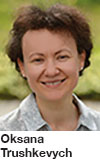 she has worked on ultrasound sensing, non-destructive testing (NDT) and evaluation since 2011. She received a PhD in engineering from the University of Cambridge in 2006 and held research positions at Cambridge (with Wolfson College junior research fellowship) and at Warwick in physics and engineering. Her research interests cover ultrasound visualisation, guided wave inspection and electromagnetic and magnetostrictive ultrasonic transducers for NDT and structural health monitoring in thick steel plates and concrete, with applications across the tunnelling, energy and transport sectors.
she has worked on ultrasound sensing, non-destructive testing (NDT) and evaluation since 2011. She received a PhD in engineering from the University of Cambridge in 2006 and held research positions at Cambridge (with Wolfson College junior research fellowship) and at Warwick in physics and engineering. Her research interests cover ultrasound visualisation, guided wave inspection and electromagnetic and magnetostrictive ultrasonic transducers for NDT and structural health monitoring in thick steel plates and concrete, with applications across the tunnelling, energy and transport sectors. Oksana is a member of the British Institute of Non-Destructive Testing (BINDT)’s Civil Engineering NDT Working Group and serves on the academic board of the Research Centre for Non-Destructive Evaluation (RCNDE). She is also a member of the industry-led ‘NDE for Fusion’ working group.
Oksana leads the School of Engineering’s involvement in the Midlands Nuclear Consortium and is Deputy Director of the Warwick Centre for Industrial Ultrasonics. She regularly publishes work in leading academic journals and is active in outreach. Oksana is a Fellow of the Warwick Institute of Engagement (WIE) and is the Widening Participation and Outreach lead for the School of Engineering.
Professor Steve Dixon has been working in the area of NDT since 1991, and most of his research has focused on
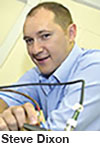 ultrasonic and eddy current techniques, particularly around the application of electromagnetic acoustic transducers (EMATs) to industry. He is a Fellow of the Royal Academy of Engineering (RAEng) and was awarded BINDT’s Roy Sharpe Prize in 2017 and the John Grimwade Medal in 2002 and 2005.
ultrasonic and eddy current techniques, particularly around the application of electromagnetic acoustic transducers (EMATs) to industry. He is a Fellow of the Royal Academy of Engineering (RAEng) and was awarded BINDT’s Roy Sharpe Prize in 2017 and the John Grimwade Medal in 2002 and 2005. Steve has held funded research fellowships from the Engineering and Physical Sciences Research Council (EPSRC), RAEng and the Royal Society and he is currently the Director of the Centre for Industrial Ultrasonics at the University of Warwick, where he is also the Deputy Head of Physics and the Director of Research. He has worked with numerous companies, especially small and medium-sized enterprises (SMEs), to develop new instrumentation in the area of ultrasonics, and has created successful spin-out companies from his research, further optimising impact in multiple international industrial sectors, including ultrasonic flow measurement. Steve has published his work in leading research journals and conference presentations.
Past winners:
1980 Mr S I Ibrahim and Mr V N Whittaker
1981 Mr D A W Pullen
1982 Mr R F Lumb
1983 Dr J M Farley and Mr J L Thomson
1984 Mr A N Robinson, Mr P Nolan and Mr G A Raine
1985 Mr C N Owston
1986 Dr D N Shackleton
1987 Dr J Ogilvy
1988 Dr P Highmore and Dr K A Short
1989 Dr G A Georgiou
1990 Dr P A Cawley
1991 Dr A McNab
1992 Dr J R Rudlin and Dr L C Wolstenholme
1993 Prof J H Bungey
1994 Dr F A Wedgwood
1995 Mr R A Smith
1996 Dr A McNab and Dr A Cochran
1997 Prof G Hayward, Mr R Banks and Mr R Farlow
1998 Prof G Hayward and Mr P Reynolds
1999 Dr A Khalid
2000 Dr B W Drinkwater, Dr A M Robinson and Dr R J Freemantle
2001 Mr R A Smith and Dr G R Hugo
2002 Dr S Dixon, Dr C Edwards and Prof S B Palmer
2003 Dr L L Morgan, Mr P Nolan, Mr A Kirkham and Mr R Wilkinson
2004 Dr E A Birt, Mr L D Jones, Mr R A Smith and Prof C B Scruby
2005 Dr A Sophian, Dr R S Edwards, Prof G-Y Tian, Dr S Dixon, Dr D Topp and Dr M Smith
2006 Mrs A Whittle
2007 Prof P Cawley
2008 Dr L Nelson
2009 Dr R A Smith
2010 Mr C Lane
2011 Prof D P Almond
2012 Prof P Cawley
2013 Prof D Mery
2014 Prof P Cawley, Dr N Brierley and Dr T Tippetts
2015 Dr C Mineo, Prof S G Pierce, Mr B Wright, Prof I Cooper and Dr P I Nicholson
2016 Dr Chris Ward and Dr Colin Brett
2017 Professor Peter Charlton, Dr Stephen Mosey, Dr Miles Weston and Dr Mark Sutcliffe
2018 Dr Colin R Brett, Dr David A Gunn, Dr Ben A J Dashwood, Simon J Holyoake and Dr Paul B Wilkinson
2019 Dr David A Gunn, Simon J Holyoake, Dr Ben A J Dashwood, Dr Paul B Wilkinson,
Dr Colin R Brett, Humphrey C Wallis, Wayne Leman and Professor John G Rees
2020 Dr Tomasz Pialucha, Dr Brian Pavlakovic, Dr David Alleyne and Professor Peter Cawley
2021 Dr Stewart Haslinger, Professor Michael Lowe, Professor Richard Craster, Dr Peter Huthwaite and Dr Fan Shi
2022 Ross Hanna, Dr Mark Sutcliffe, Professor Peter Charlton and Dr Stephen Mosey
2023 Sam Hurrell, Professor Peter Charlton, Dr Stephen Mosey, Dr Owen Rees-Lloyd and Dr Richard Lewis
The Ron Halmshaw Award
Award criteria
Purpose: The Ron Halmshaw Award is awarded for the best paper published in Insight in the preceding year, on any aspect of industrial radiography or radiology.Details of the award: The prize is in the form of a certificate, a fixed award sum (£350) by cash from the Ron Halmshaw Fund and an invitation to the NDT or CM Annual Conference Dinner with one night's accommodation.
Eligibility: Anyone who has published a radiography or radiology paper in Insight will be considered.
Frequency: Yearly, if a suitable candidate is deemed.
Nomination arrangements: Automatic. All members of the Institute’s NDT Sub-Committee will be invited to submit nominations for the award.
Entries: Entries submitted (on a form to be made available by the Institute) will be sent to the Secretary of the Institute.
Awarding arrangements: In January each year, a memo is issued to the judging panel, containing voting instructions, marking sheet, shortlist of name(s), paper title, issue, month and page number and a voting form embossed with the Institute seal. The deadline for return to the Secretariat is 31 March. A judging panel of three is appointed by the NDT Sub-Committee.
In the interest of achieving fair, bias-free results, a system is operated that requires each panel member (any listed authors excepted) to vote anonymously to the Awards Secretary, who is responsible for totalling up the points awarded and notifying the winner to the Secretary.
Publicity: The award will be fully reported in Institute publications and the Secretariat will issue details in a press release to the technical and engineering institutional press.
Presentation: The prize will normally be presented at the NDT Annual Conference, though another appropriate Institute event may be chosen if necessary.
Committee: NDT Sub-Committee.
Winners
The 2024 winners are Dr Shant Kenderian, Dr Joseph (Toby) Case, Paul M Adams and Anita Gregorian for their paper, titled: ‘Contrast-based notch-to-crack transfer function for digital radiography’, which appeared in Insight, Vol 66, No 7, pp 400-408, July 2024 (DOI: 10.1784/insi.2024.66.7.400).
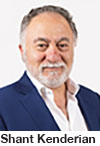
Dr Shant Kenderian received his PhD in materials science and engineering from the Johns Hopkins University in 2002. His studies were focused on advanced non-destructive testing (NDT) methods for materials characterisation, under the tutelage of the late Professor Robert E Green, Jr, and Dr Boro Djordjevic. Shant later joined the National Aeronautics and Space Administration (NASA) and The Aerospace Corporation, which provides oversight for the space programme for the US government. Shant is very active with the American Society for Nondestructive Testing (ASNT) and Academia NDT International, collaborating with sister societies. He has authored more than 50 journal papers and conference proceedings and 75 technical reports. He has received multiple awards and recognitions from The Aerospace Corporation, NASA, Lockheed Martin
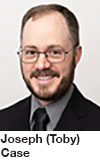 , ASNT, the International Committee for Non-Destructive Testing (ICNDT), the Japanese Society for Non-Destructive Inspection (JSNDI), the Institute of Electrical and Electronics Engineers (IEEE), the Indian Society for Non-destructive Testing (ISNT) and now the British Institute of Non-Destructive Testing (BINDT).
, ASNT, the International Committee for Non-Destructive Testing (ICNDT), the Japanese Society for Non-Destructive Inspection (JSNDI), the Institute of Electrical and Electronics Engineers (IEEE), the Indian Society for Non-destructive Testing (ISNT) and now the British Institute of Non-Destructive Testing (BINDT). Dr Joseph (Toby) Case received his PhD in EE in 2013 from Missouri University of Science and Technology (Missouri S&T) with an emphasis in microwave and millimetre wave imaging at the Applied Microwave Nondestructive Testing Laboratory (amntl) with Dr Reza Zoughi as his advisor. He is currently a member of the technical staff at The Aerospace Corporation since 2014. He performs research in the Physical Sciences Laboratory in the field of non-destructive testing for X-ray, ultrasound and more. He specialises in
numerical methods, non-
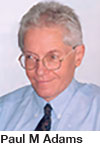 uniform sampling, signal and image processing and reconstruction techniques. He has co-authored over 75 journal and conference publications.
uniform sampling, signal and image processing and reconstruction techniques. He has co-authored over 75 journal and conference publications.Paul M Adams received a bachelor’s degree and a Master of Science degree from the University at Albany (New York) and the University of Southern California, respectively. He has been employed at The Aerospace Corporation for 46 years, specialising in spectroscopy and microscopy of materials and X-ray radiographic inspections. He is an ASNT Level 3 radiographer.
Anita Gregorian holds a master’s degree in materials engineering from California State University,
 Northridge. She is a member of the technical staff at The Aerospace Corporation, where she conducts research in the Physical Sciences Laboratory. Her focus is on non-destructive testing methods such as ultrasound, radiography and more. She currently serves on the Board of Directors for ASNT.
Northridge. She is a member of the technical staff at The Aerospace Corporation, where she conducts research in the Physical Sciences Laboratory. Her focus is on non-destructive testing methods such as ultrasound, radiography and more. She currently serves on the Board of Directors for ASNT.Past winners:
1995 J-E Holmström
1996 Dr E A Birt
1997 A B Wooldridge, Dr R K Chapman, Dr G A Georgiou, I Munns and G S Woodcock
1998 Dr S Ekinci, N Bas, M Aksu, A Yıldırım, M Bingöldag, T Kurtcebe, M Dogruöz, S Sarıçam and N Yılmaz
1999 A McNulty, J McNab and W K J Greenwood
2000 P R Vaidya
2001 R R da Silva, M H S Siqueira, L P Calôba and J M A Rebello
2002 A G Vincent, V Rebuffel, R Guillemaud, L Gerfault and P Y Coulon
2003 Dr G A Georgiou and Mr C R A Schneider
2004 S Smalley and G Wilson
2005 D Mery, D Hahn and N Hitschfeld
2006 Dr G-R Jaenisch, C Bellon, U Samadurau, M E Zhukovskiy and S V Podoliako
2007 V Rebuffel and J-M Dinten
2008 S F Burch and B A Stow
2009 Q Shen, J Gao and C Li
2010 K Arunmutha, P Arun Kumar, T Saravanan, J Philip, T Jayakumar and B Raj
2011 Dr S F Burch
2012 V Riffo and D Mery / J Guo, L Zeng, B Li and W Yu
2013 X Zhao, J-J Hu, T Yang and F Wang
2014 W Gao and Y H Hu
2015 Ge Lijing, Li Linsheng, Xie Jialong and Lin Guoxiang
2016 Changying Dang, Jianmin Gao, Zhao Wang, Yulin Xiao and Yalin Zhao
2017 Domingo Mery, Vladimir Riffo, Irene Zuccar and Christian Pieringer
2018 Stefano Ridolfi
2019 Johann Kastner, Christian Gusenbauer, Bernhard Plank, Jonathan Glinz and Sascha Senck
2020 Andreas Michael Stock, Gabriel Herl, Professor Dr Tomas Sauer and Professor Dr-Ing Jochen Hiller
2021 Mahdi Mirzapour, Amir Movafeghi and Effat Yahaghi
2022 Abdel Rahman Dakak, Valérie Kaftandjian, Philippe Duvauchelle and Patrick Bouvet
2023 Dr Ross Hanna, Dr Mark Sutcliffe, David Carswell, Professor Peter Charlton and Dr Stephen Mosey
Details of all Institute awards can be found here.